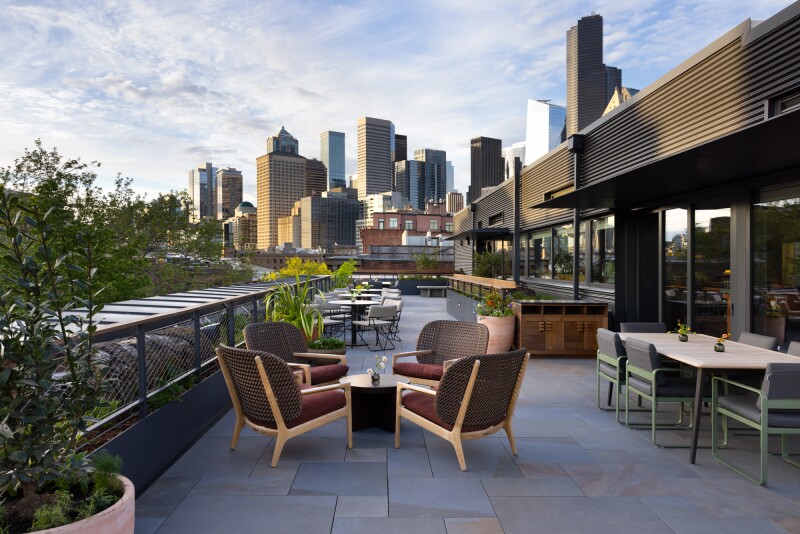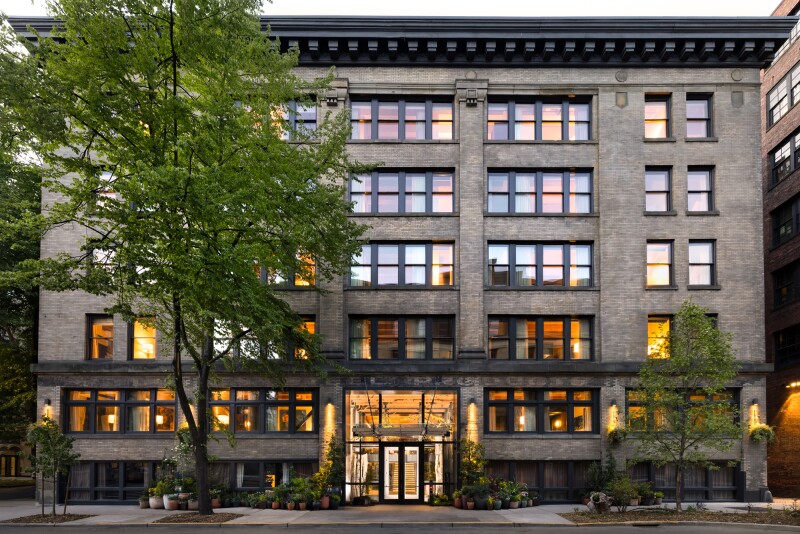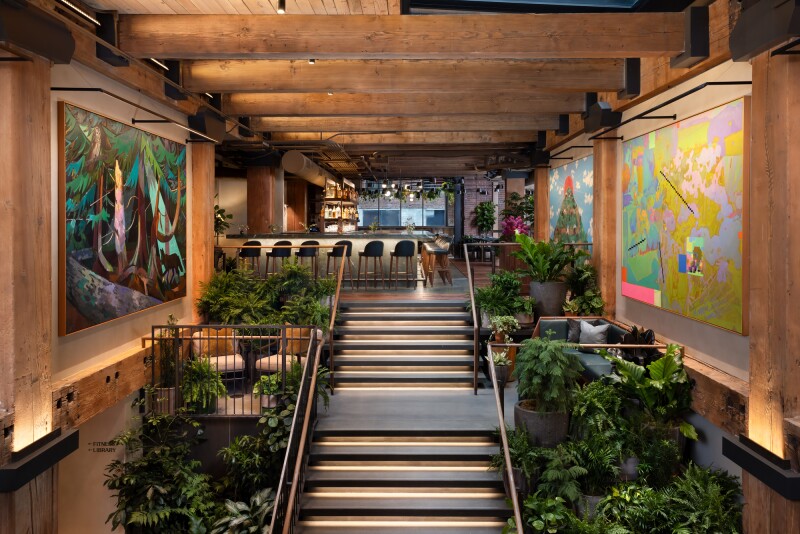Rates: From $359
The Afar take
Set inside a restored warehouse in Seattle’s Pioneer Square, Populus Seattle aims to be more than just a stylish place to sleep. Since opening in May 2025, the hotel has been working to become the cultural anchor of RailSpur, a newly imagined micro-district within historic Pioneer Square where three early 20th-century buildings and their once-forgotten alleys have been transformed into a pedestrian-first hub of art, design, and dining. In many ways, it already delivers on that ambition, with an art program bringing creatives from around the world to participate in on-site residencies and a rooftop bar (the only one in the area) that’s quickly becoming a hangout spot for locals and visitors alike.
The Populus hotel brand, which bills itself as a “carbon positive” hotel (with the goal of removing more carbon from the atmosphere than it emits), began with Populus Denver, opened in late 2024. With its sculptural aspen‑tree form and forest motif, the Colorado hotel was purpose built to be eco-friendly (and was named one of Afar’s Best New Hotels of 2025). Meanwhile, the Seattle property’s sustainability story is more rooted in reuse and preservation. The original Douglas fir flooring was carefully pulled up, restored, and reimagined as custom furniture and frames for artwork. The hotel offsets its carbon footprint through local reforestation projects and has converted its rooftop into a pollinator-friendly native plant habitat, complete with working bee boxes. A central “Ghost Forest” installation—where a fallen tree acts as a nursery for new plant life—captures the hotel’s regenerative ethos.
The hotel was built with the community in mind—locals come for wood-fired meals at Salt Harvest or glacier-inspired cocktails on the rooftop at Firn. It’s an ideal hangout spot for those coming to see the neighborhood’s monthly First Thursday art walks that spill into the RailSpur alleyways. And through a partnership with global art production house ARTXIV, the hotel hosts rotating residencies for artists, offering working studio space next door and showcasing their work throughout the property. Every piece is for sale, and when one is purchased, it’s replaced with something new, which supports artists and keeps the space evolving. Books by Seattle authors fill a library and a forthcoming art room is designed for performances and workshops.
Who’s it for?

Firn, Pioneer Square’s first rooftop bar at Populus Seattle, has already become a local hangout spot.
Courtesy of Populus Seattle
Populus Seattle is for travelers who like their hotels to feel less corporate and more personal, unique, and connected to the place they’re in. It’s a great fit for people who appreciate thoughtful design, local art, and a historic neighborhood that still feels lived-in.
Soccer fans will appreciate the hotel’s location, a short walk from Lumen Field, home of the Seattle Sounders and one of the stadiums hosting the 2026 FIFA World Cup. Locals, too, have embraced the space as a go-to spot for date nights, weekend brunch, and dinners after art walks, thanks to its pair of restaurants.
While the hotel shines in design details, it’s not a full-service resort with pools or a spa; those looking for lots of on-site amenities might be happier elsewhere.
The location

The Populus Seattle aims to be a hub for the community as much as for travelers.
Courtesy of Populus Seattle
Once the domain of saloons and shipping warehouses, the greater Pioneer Square area has seen cycles of boom, bust, and reinvention over the past century—from its heyday as Seattle’s original downtown to stretches of disinvestment marked by vacant storefronts and neglected historic buildings. In recent years, though, it’s seen a steady resurgence, with more than 30 new businesses opening since 2024, major public-realm investments making the streets more pedestrian friendly, and a surge of public art projects breathing fresh life into its brick-lined blocks.
Today, the neighborhood is home to art galleries, indie bookstores, vintage shops, and some of Seattle’s most exciting new restaurants and bars. The hotel itself is part of RailSpur, a pedestrian-focused micro-district that’s reactivating historic buildings and alleyways with public art, live music, and cultural programming. On the horizon: Renee Erickson’s trio of new restaurants (a brewery, wood‑fired pizzeria, and European‑inspired bistro), plus Seattle’s first Death & Co cocktail bar slated for a summer 2025 opening. Populus Seattle is also a short walk from stadiums, the light rail, the waterfront, and Pike Place Market.
A central “Ghost Forest” installation—where a fallen tree acts as a nursery for new plant life—captures the hotel’s regenerative ethos.
The rooms
The moment I stepped into my room (a cozy Cedar Corner King) at Populus Seattle, the history was palpable—original Douglas fir beams overhead, rough-edged brick walls, and a moody color palette of deep blues, warm taupes, and muted rust reminiscent of Pacific Northwest landscapes.
The hotel has 120 guest rooms (ranging from 298 to 1,015 square feet), and the door number on each is screen-printed with an illustration of a plant native to Washington. It’s a botanical detail I clocked again later in the paper flowers that bloomed from blown-glass vases (a nod to Seattle’s glassblowing pedigree) and a stack of books on Pacific Northwest ecology in my guest room. I loved the handcrafted touches, like the ceramic mugs from local artisans and custom wood-and-leather furniture (with exposed inlaid metal accents that nod to the building’s industrial past), although the brick walls and beams—attractive as they are—do make the rooms feel a touch darker than some travelers might prefer.
The bathroom felt like a moody little jewel box with black subway tiles, a marble sink, gold fixtures, and a rainfall shower, as well as full-size Aesop products, bamboo toilet paper, and a Matouk robe I lingered in post-shower. Suites have soaking tubs and double vanities, which feel indulgent; in my standard room, counter space was limited. The minibar highlighted neighborhood businesses: cans of Reuben’s Brews, trail mix with Rainier cherries, and a pour-over kit from Monorail Espresso, Seattle’s first coffee cart.
The food and drink
At Salt Harvest, the all-day restaurant, executive chef Conny Andersson’s seasonal menu is built around locally sourced seafood, produce, and meats, much of it charred over an open flame. Breakfast and lunch offerings include apple pie overnight oats and a crispy fish sandwich served with preserved lemon and caper remoulade, but dinner is where the restaurant truly shines. For mine, I ordered the local oysters, served with an ice wine mignonette (pepper, cucumber, and shallots), and Neah Bay wild salmon, served with local asparagus and topped with a Dungeness crab hollandaise. (Both scored high marks from this seafood snob.) Between courses, my server offered a very Washington-style palette cleanser of Rainier cherries. Had I been dining with someone, I would have begged them to order the spätzle (made for two, with foraged mushrooms, spinach, and Beecher’s cheese), which I spotted at nearby tables. Everything is served on ceramic plates hand-thrown by a local artist in a plant- and art‑filled dining room.
Upstairs at Firn, Pioneer Square’s first rooftop bar, cocktails are organized by ice style (shaved, crushed, or geometric) and revolve around seasonal ingredients. The Letters to the Forest, for example, calls upon a herbaceous and aromatic mix of Averna amaro, Douglas fir eau-de-vie, blackberry, honey, thyme, alpine bitters, and lemon. Small plates like Dungeness crab dip, charcuterie, and pickled bites round out the menu. Guests can sit at the indoor bar or on the native wildflower-lined patio, which offers views of Puget Sound and attracts butterflies and hummingbirds.
Staff and service

The entryway stairs at the Populus Seattle are lined with artwork the hotel commissioned from global artists.
Courtesy of Populus Seattle
Everyone I interacted with—front desk, housekeeping, the servers at Salt Harvest—was warm, easygoing, and genuinely helpful without ever hovering.
Accessibility
The Populus Seattle has seven ADA-compliant guest rooms for travelers with mobility issues, and all are accessed via large elevators in the lobby.
Sustainability
Rather than starting from scratch, the hotel restored and repurposed its original 1907 warehouse, reducing its carbon footprint by more than a third through adaptive reuse. (That’s roughly the equivalent of avoiding 2.2 million car miles.) The remaining emissions are offset with forest-based carbon credits in nearby King County.
The property runs on 100 percent renewable electricity and renewable natural gas, composts scraps with on-site biodigestion, and participates in a “One Night, One Tree” program with the National Forest Foundation, planting a tree for each night of your stay.








